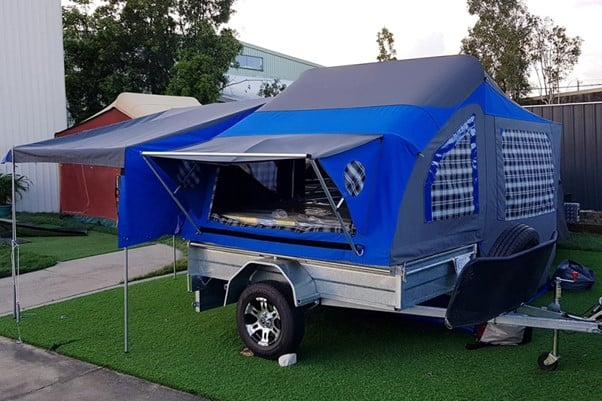A Beginner's Guide to Trailer Tents for Camping
Bargain Storage
November 25th, 2024

If you are new to camping, then the idea of planning a trip can be daunting. Don't worry. This step-by-step guide is all you need to pack and prep your trailer tent camping gear. Camping is an incredible way to spend time with your loved ones and enjoy nature. Before you hit the road, there is much to consider, but follow these essential steps to execute the perfect trip.
The importance of storage in trailer tents for camping
Regarding trailer tents for camping, storage is an essential factor to consider. These types of tents are designed to be compact and portable, which means they need to fit into a relatively small space when not in use. One of the benefits of trailer tents is that they usually come with built-in storage compartments or cabinets, which can be used to store camping gear, cooking supplies, and other essentials. Some models even have dedicated storage areas for bikes or other large items. When choosing a trailer tent, it's essential to consider the amount of storage space you will need for your camping trips and whether or not the tent you are considering has adequate storage options.
Packing and prepping trailer tents for camping
When it comes to camping, one of the most important tasks is preparing your gear, especially if you plan to use a trailer tent. Properly packing and prepping your trailer tent before your trip can ensure a more comfortable and stress-free camping experience.
The four Ws
First, decide on your trip's who, what, when, and where. Who is going, what are you planning, and when and where are you heading? Once this is decided, you will know what comes next, from trailer tents for camping equipment and gear to food shopping.
Reservations
Once your route is set, look into reserving campsites. If it is peak season, you will need a reservation to ensure your spot; otherwise, you risk disappointment. If camping with children, you will want to choose sites with a playground, picnic tables, and recreational facilities. It's also essential to determine whether the site is pet-friendly if you plan to travel with pets. If the campsites offer equipment for hire, you can take advantage of that option and leave more stuff at home to save packing space for sports gear and other equipment. You should research to ensure you don't require permits to camp at any of your planned destinations.
Activities
With your destinations planned, you can start planning the activities you will enjoy on the road. Whether you must pack board games for travel or sports equipment at your destination, ensure you have the right gear. Think about what you need for fishing, hiking, kayaking, cooking, crafting, card games, or stargazing. Plan for unexpected weather changes if you get hit with a rainy day when you expect sunshine.
Prepping
Now you can prepare the items you will need throughout your big trip. Initially, what seemed daunting is now more straightforward, with a clear plan.
- Tents, sleeping bags, pillows.
- Stools, camping chairs, and a fold-out table.
- A cooler for chilled drinks and food.
- Drinking water.
- Reusable water bottles.
- Food supply and soft drinks.
- Camping stove, extra fuel.
- Cookware and utensils.
- Paper towels and trash bags.
- Tea towels.
- Wipes – antibacterial wipes, baby wipes, cleaning wipes, wet wipes
- Flashlights and spare batteries.
- Portable chargers for devices.
- Sunscreen.
- Bug spray.
- First aid kit.
- Earplugs.
- Medication.
- Toiletries.
- Toilet paper.
- Ropes, string, tarps, duct tape.
- Clothes for any weather (make sure you pack spares).
- Hiking gear.
- Boots and shoes.
- Swimwear or winter wear, depending on the season.
- Entertainment.
- Electric brakes (especially if you’re towing a caravan).
This is an essential list to get you started, be sure to plan your food meal by meal to ensure you have plenty of supplies. Also, remember your s'mores supplies.
Packing
Gather all of your equipment for inspection before you pack anything – you want to ensure your gear is in good shape before taking it on a trip. In addition, it gives you time to tackle any repairs or buy replacements if necessary. Now you can pack! Organize your gear in secure containers or bags and label each so you can quickly identify everything when you arrive. Use a tarp to secure and protect exposed camping gear once loaded. You can also use the tarp to keep your clothing and supplies dry when you reach your destination. Top tip for toasty clothes on cold mornings – tuck them in your sleeping bag. They might be rumpled, but you're camping!
Final thoughts
Nothing is better than hitting the road with trailer tents for camping, but planning is necessary to ensure everyone has a good time. It's also essential to keep everyone safe and ensure that everything you have is in good working order before you reach your destination. So, make yourself a checklist once you take care of the planning stage, so the packing stage is a cinch.
Storage Tips & Local News | Bargain Storage Blog
